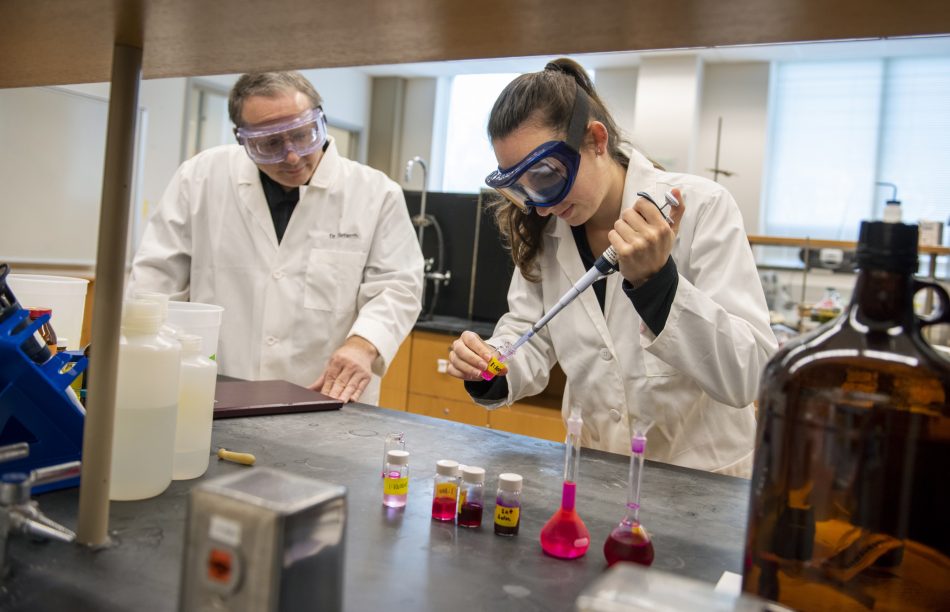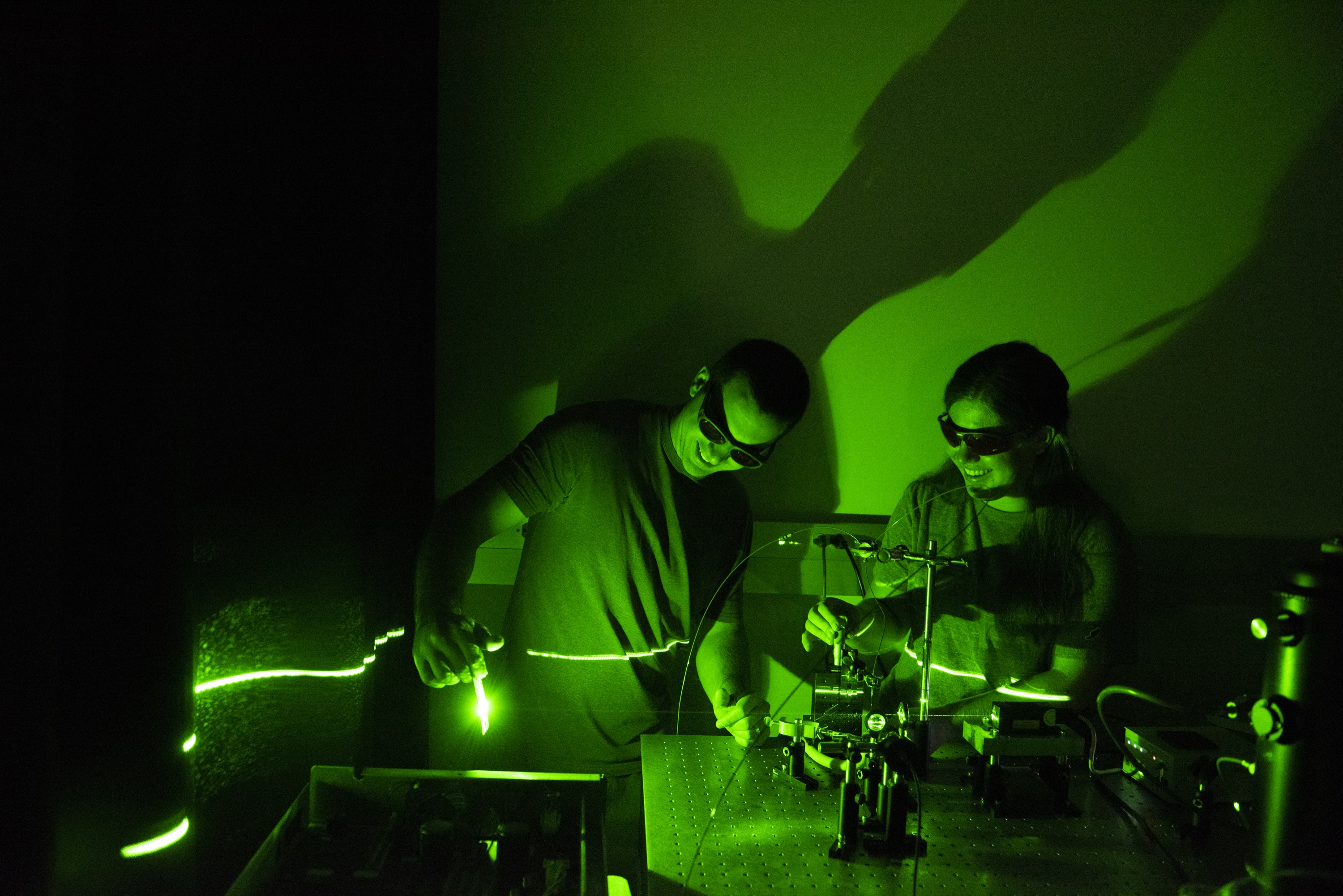On Wednesday, 45 Elon students presented the progress they've achieved through two months of work as part of the annual Summer Undergraduate Research Experience.
During a two-hour showcase on Wednesday, 45 Elon students demonstrated what can be achieved by dedicating time to undergraduate research and cultivating deeper relationships with their research mentors as part of the Summer Undergraduate Research Experience (SURE).
Oral presentations exploring topics including the sciences, arts, humanities, education and beyond were the culmination of the hard work these student researchers have undertaken with their mentors during the start of SURE eight weeks ago. The program offers students the opportunity to advance their research while supporting their academic and professional development through a range of workshops on topics including preparing for graduate school, honing their writing skills, polishing their resumes and fine-tuning their public speaking.

SURE is a competitive program that provides participating students, most of whom are rising seniors, with a $3,000 stipend to support their research. Students are also provided on-campus housing, if needed.
“The time that SURE offers is often most valuable part to them,” said Meredith Allison, professor of psychology and director of undergraduate research at Elon. “They have this dedicated time. They are not having to take other classes and juggle assignments. They can just focus on this one project.”
For Bailey McCollum ’22, SURE has offered the opportunity to conduct a pilot survey of 50 health care professionals to advance her research looking into how different elements of patient interactions can contribute to professional burnout. The assessment of the survey results with her mentor, Assistant Professor of Psychology Erika Lopina, led them to narrow the focus of the full survey to just the patient interaction rather than also exploring pre- and post-interaction elements. Their study also led them to add questions looking at the complexity of the patient’s medical condition and other elements of the interaction that could contribute to burnout as they explore how to mitigate the risk of burnout.
“I think the complexity of the medical case was a good thing to add,” McCollum said while fielding questions following her oral presentation on Wednesday. “If you’re not able to treat the patient or have some kind of positive aspect from the process, that could more easily add to burnout. That could be a pretty big factor.”
McCollum said that SURE has allowed her the space to devote more time and energy to her research, which will move forward this fall with a larger survey of health care professionals. “The semester can get incredibly busy, and there is often not enough time to get a big chunk of work done,” she said. “During SURE, we were able to launch the pilot study, and choose a future direction for our full study.”
Rebecca Carranza ’22 has spent her time in SURE this summer conducting field research that has taken her to the Penny’s Bend Nature Preserve in Durham County where she has collected data about plants that host populations and eggs sacks of treehoppers. These insects use their host plants to convey mating signals, and Carranza is looking at how different plants relay different mating signals, and how that can contribute to the evolution of the treehoppers.
Her work this summer with mentor Jen Hamel, an associate professor of biology, has allowed her to zero in on specific plants used locally by the treehoppers, and this fall she will continue her research by measuring the mating signal waves from plants used by treehoppers in the Elon greenhouses.

Victoria Gorman ’22 has been in the McMichael Science Center labs this summer working with her mentor, Professor of Chemistry Karl Sienerth, determining how different explosives interact with light-emitting luminescors. The goal is to create a cheap and deployable method for detecting explosives from a crime scene, with law enforcement officials now relying on more complex methods that have created a backlog of cases. “There are 570,000 backlogged cases at forensic crime labs due to small towns and cities not having the funding or resources to conduct these tests,” Gorman explained to the audience during her presentation Wednesday.
The interaction between explosives and the luminescors can cause a quenching of the light emitted from the luminescors, and tracking the rates at which that light is quenched can create a signature specific to the explosive, Gorman said. “The slope (of the quenching graph) is the footprint that can be used to determine which explosive is present, and how much is present,” Gorman explained during her presentation.

Allison said SURE also deepens the engagement students have with their research mentors, faculty members whose schedules are also often less busy during the summer, which affords them the opportunity to work more closely with their mentees. “Faculty also like the dedicated time for them to pause and think and to work just on this with their students,” Allison said.
Many student-faculty pairs will have “joint working time” during which they spend time working on their individual research projects together. It provides an opportunity to do more than just discuss research updates or conduct analysis, but to see how each other works, Allison said. “It’s a way to be a model — this is how I work, this is how I write,” she said. “Faculty have told me they get to know their students so much better because of these extra opportunities for interaction.”
That’s been the case for Eukela Little ’22 and her mentor, Associate Professor of Psychology Buffie Longmire-Avital. Little has been working with Longmire-Avital since she was a sophomore, and SURE provided her an opportunity to advance her research into a model for self-care for Black women and the creation of a tele-health program as well as to get to know Longmire-Avital better.
A Lumen Scholar, Little said this summer has allowed her to make great strides in her research by being able to dedicate more time to her work. “It’s been amazing, honestly,” Little said. “I really only had to focus on my research and working with my mentor and making progress, without having to work on other assignments.
The time spent with Longmire-Avital has been valuable, Little said. Their discussions this summer have gone beyond her research to include looking at potential jobs and fellowships after graduation. “We have made strides in terms of continuing to get to know one another,” Little said. “I’ve been able to get to know her on a deeper level, which has been very rewarding. She’s been able to touch on other parts of mentorship outside of our project.”



